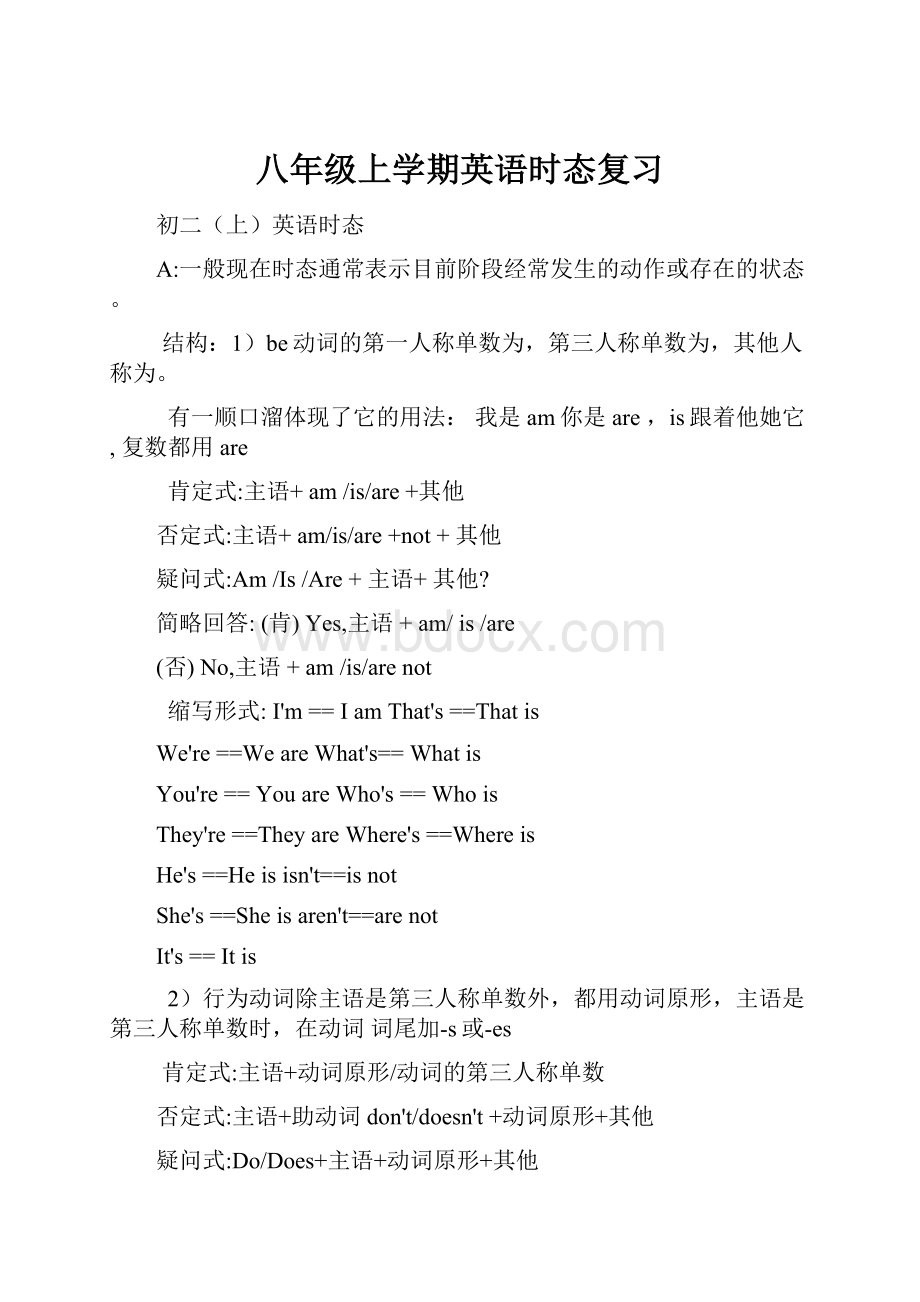八年级上学期英语时态复习.docx
《八年级上学期英语时态复习.docx》由会员分享,可在线阅读,更多相关《八年级上学期英语时态复习.docx(21页珍藏版)》请在冰豆网上搜索。

八年级上学期英语时态复习
初二(上)英语时态
A:
一般现在时态通常表示目前阶段经常发生的动作或存在的状态。
结构:
1)be动词的第一人称单数为,第三人称单数为,其他人称为。
有一顺口溜体现了它的用法:
我是am你是are,is跟着他她它,复数都用are
肯定式:
主语+am/is/are+其他
否定式:
主语+am/is/are+not+其他
疑问式:
Am/Is/Are+主语+其他?
简略回答:
(肯)Yes,主语+am/is/are
(否)No,主语+am/is/arenot
缩写形式:
I'm==IamThat's==Thatis
We're==WeareWhat's==Whatis
You're==YouareWho's==Whois
They're==TheyareWhere's==Whereis
He's==Heisisn't==isnot
She's==Sheisaren't==arenot
It's==Itis
2)行为动词除主语是第三人称单数外,都用动词原形,主语是第三人称单数时,在动词词尾加-s或-es
肯定式:
主语+动词原形/动词的第三人称单数
否定式:
主语+助动词don't/doesn't+动词原形+其他
疑问式:
Do/Does+主语+动词原形+其他
简略回答:
(肯)Yes,主语+do/does
(否)No,主语+do/doesnot
缩写形式:
don't==donot
doesn't==doesnot
注意:
have的第三人称单数为has
用法:
1.表示事实,现状,性质或经常的,习惯的动作,常与often,usually,always,sometimes,today,everyday,onceaweek,everyfiveminutes,onSundays等时间状语连用,
eg.Hehasabrother.
2.表示普遍真理.eg.Theearthgoesroundthesun.
3.表示在现在时间里所发生的一个动作.
eg.Herecomesthetrain.
4.在时间和条件状语从句中代表一般将来时.
eg.I'llgowithyouifyouarefreetomorrow.
B:
一般过去时棗表示过去发生的动作或存在的状态,一般过去时通常由动词的过去式表示。
结构:
1.动词的第一、三有称单数用,其他人称用,其肯定式,否定式,疑问式和简略回答形式与一般现在时相似。
2.行为动词的过去式分为规则和不规则两种,规则动词的过去式是在动词后加或,不规则动词参照不规则动词表,需要专门记忆。
肯定式:
主语+动词的过去式+其他 eg.Igotupatsixthismorning.
否定式:
主语+didnot+动词原形+其他 eg.Johndidn'tliveherelastyear.
疑问式:
Did+主语+动词原形+其他 eg.Didyouseehimamomentago?
简略回答.(肯)Yes,主语+did (否)No,主语+didn't.
用法
:
1.主要用于过去某个时间发生的动作或状态.
eg.Myfatherwasatworkyesterday.
2.表示过去经常或反复发生的动作,常与often,always等表示频度的时间状语连用.
eg.Healwayswenttoworkbybuslastsummer.
3.和when等连词引导的状语从句连用.
eg.Whenshereachedhome,shehadashortrest.
4.常与表示过去的时间状语,如…ago,yesterday,lastweek,intheolddays,whenIwasfiveyearsold,in1995等连用.
eg.Theybegantheworktwomonthsago.
Wereyoubornin1981?
Yes,Iwas.
C:
一般将来时棗表示将来发生的动作或存在的状态
结构:
助动词shall/will+动词原形(当主语第一人称时,一般用shall,当主语为第三人称时,用will,但主语为第一人称时,也用will
肯定式:
主语+shall/will+动词原形+其他
否定式:
主语+shall/will+not+动词原形+其他.
疑问式:
Shall/Will+主语+动词原形+其他
简略回答:
(肯)Yes,主语+shall/will.
(否)No,主语+shall/will+not…
缩写形式:
'll==shall/will
shan't==shallnot
won't==willnot
用法:
1.表示将要发生的动作或情况,常用时间状语有:
later(on),soon,inamonth,nexttime,fromnowon,tomorrow等.
eg.Ishallbeeighteenyearsoldnextyear.
MaybeChina'spopulation_______(pass)1,300,000,000bytheyear2005.
2.表示某种必然的趋势
eg.Fishwilldiewithoutwater.
解析:
1.在以第一人称为主语的问句中,常用shall表示提议和询问情况,在以第二人称作主语的问句中,用will表示请求.
eg.Whereshallwehavethemeeting?
Willyoupleaselendmeyourpen?
2.当主语是第一人称时,用will表示意愿.决心.允诺.命令等.
eg.IwillgiveyouanEnglish--Chinesedictionaryforyourbirthday.
3.在时间或条件状语从句中,一般用一般现在时代替一般将来时.
eg.Tomwillwritetomewhenhegetsthere.
4.begoingto+动词原形也可表示将来时.
(1).表示主观意愿.打算等.
eg.He'sgoingtolearnEnglishnextterm.
(2).根据已有迹象,可能要发生的情况
eg.Lookattheblackclouds!
----Itisgoingtorain.
D:
现在进行时棗表示目前或目前阶段正在进行的动作。
结构:
am/is/are+动词的-ing形式
用法:
1.表示目前发生(进行)的动作(不指状态),常用时间状语有:
now,atthemoment等,并常出现在祈使句的句子中,与look,listen连用.
eg.Areyouwritingalettertoyourfatheratthemoment?
Listen!
Sheissinginginthenextroom.
2.表示目前阶段正在进行,而此刻不一定在进行的动作.
eg.Theyareplantingtreesthesedays.
3.表示按计划或安排即将进行的动作,表示这种动作的动词有:
come,go,leave,arrive,start,see等,并常与表示将来时间的状语连用.
eg.TheyareleavingforAustraliatomorrowafternoon.
注意:
某些表示感觉或状态的动词,如love,like,prefer,hate,see,know等一般不用现在进行时.
eg.Lucyprefersarttoscience.
Exercises:
一. 般现在时.
1.MyEnglishteacheraboutthirtyyearsold,butheyoungerthanhereallyis.
A.is,lookB.is,looksC.am,look
2.Jimveryhard,buthestillalittleweakinChinese.
A.studies,isB.study,isC.doesn’tstudy,is
3.Weallknowthatthesunroundtheearth.
A.goesB.don’tgoC.doesn’tgo
4.TheretwelvemonthsinayearandJanuaryfirst.
A.is,comesB.are,comeC.are,comes
5.Whothekitebestofall,Jim.LucyorLily?
A.fliesB.flyC.areflying
6.theGreatWalloneoftheplacesofgreatinterestsinChina?
A.WasB.DoC.Is
7.youusuallytoschoolwithclassmates?
A.Do,comesB.does,comeC.Do,come
8.shehomeatsixo’clockeverymornig?
A.Do,comesB.Does.ComeC.Do,come
9.MymotherlikewatcingTV,soshetobedveryearlyeveryevening.
A,doesn’t,goB.don’tgoC.doesn’tgoes
10.MrGreenusuallynewspapersaftersuppereveryday.
A.readB.readingC.reads
二. 一般过去式.
1.Thetwointhesameclasslastyear.
A.areB.wasC.were
2.---Whereyou?
----Iwenttobuysomefoodforsupper.
A.do/goB.were/goC.did/go
3.ThestudentsinLiLei’sclassonafarmlastweek.
A.workB.worksC.worked
4.thatworkerinashoefactoryayearago?
A.Do,workB.Did,workedC.Did,work
5.---Didyoufindyourpen?
----Yes,Iittwohoursago.
A.foundB.findC.finded
6.yourmothertoworklastSaturday?
A.Did,goB.Do,goC.Does,go
7.Theynotlatethedaybeforeyesterday.
A.didB.wereC.are
8.theyawayfromschoollastOctober?
A.DidB.WereC.Do
9.youtoschoollastSunday?
A.Did,comeB.Do,comeC.Were,come
10.Whattheyforbreakfastlastweek?
A.were,haveB.did,haveC.will,have
11.Myfriendhishomeworkfifteenminutesago.
A.finishB.finishesC.finished
12.Theboysonlysubjectslastterm,butthistermtheyfive.
A.have,haveB.had,hadC.had,have
13.WhyAnnTVlastnight?
A.didn’t,watchB.don’twatchC.doesn’twatch
14.Theystoppedherebecausetheythewaytothestation.
A.didn’tknowB.don’tknowC.willknow
15---Whereyoufindyourticket?
----Iitontheground.
A.did,foundB.do,foundC.were,find
三. 现在进行时.
1.Can’tyouseeUncleWangandhisfriendssomemachines?
A.ismakigB.aremakingC.make
2.MyfatherTVwithmymothernow.
A.watchB.watchingC.iswatching
3.It’ssixo’clockintheevening,Myfamilysupperatthetable.
A.eatsB.iseatingC.areeating
4.LucyandLilytospeakChinesewithMissGao.
A.Is,tryB.IstryingC.Are,trying
5.Thedogitselfoutsidethedoor.
A.iswashingB.washC.washes
6.ThestudentsinClassOnecarefullytotheirEnglishteacher.
A.islisteningB.islookingC.arelistening
7.Listen!
Thechildrenintheopenair.
A.singingB.issingingC.aresinging
8.What’sthematter,LiLei?
Iformypen.
A.amlookB.amlookingC.look
9.Let’sgointotheclassroom.Thebell.
A.ringingB.isringingC.isring
10.Themanisbadlyhurtandheontheroadsadly.
A.islyingB.arelyingC.lieing
四. 一般将来时.
1.Thestudentsbackintwohours.
A.comeB.iscomingC.came
2.WhatyouwithyourclassmatesthisSundayafternoon?
A.are,doB.do,doC.willdo
3.ThereanEnglishpartyinourclassthisevening.
A.willhaveB.aregoingtohave.C.isgoingtobe
4.WeiHuavisittheGreatWallduringthissummerholiday?
A.Do,goingtoB.Is,goingtoC.Will,goingto
5.WhentheyleaveforBeijing?
A.will,going.B.will,/C.do,goingto
6.---Whereareyougoing?
---Itheshopsforsomefruit.
A.amgoingtoB.gotoC.shallgoingtogoto
7.Whichorangestheytobuy?
A.are,goingB.will,goingC.do,going
8.Mymothersaysthatshebuymeaschoolbagbetterthanthisone.
A.isB.shallC.will
9.MrGreenisafraidthatJimbehindtheotherstudentsafterhecomesback.
A.willfallB.willfellC.isgoingtofell
10.Thestudentsinmyclassharderthanbeforethisterm.
A.isgoingtostudyB.willgoingtostudyC.willstudy
A:
一般现在时态(状语often、every、uaually、sometimes等)
1.I(be)aChineseboy.Iwantto(be)anEnglishteacherwhenI(grow)up.Mysister(be)inGradeThree.She(be)seventeenyearsold.She(want)toenterDongguanMiddleSchoolnextterm.She(like)singingand(read).She(notlike)playingbasketball.ButI(like)playingbasketball.I(notlike)singing.I(like)(draw).you(like)drawing?
2.A:
Wesometimes(visit)myuncle,butsometimeshe(notbe)athome.Whenwe(get)there,he(be)out.We(have)to(wait)forhiminfrontofhishouse.Atabouttwelveo’clockhe(get)home.Weoften(have)agodtime.You(like)to(visit)myuncle?
B:
B:
Yes,Iyourbrotherwant(visit)myuncle.A:
No,he.He(be)verybusy.Heoften(do)hishomeworkonSundays.
一般将来时态(状语:
nextweek,Monday,year,month,tomorrow,soon等)1.A:
Whatyou(do)tomorrow?
B:
I(visit)theGreatWall.A:
Howyou(go)there?
B:
I(go)bybus.2A:
CanI(go)withyou?
B:
Sure.Let’s(leave)ataboutsevena.m.A:
Sorry!
Ican’t(be)soearly.Shallwe(leave)abitlater.Whatabouthalfpastseven?
B:
OK!
Wherewe(meet)?
A:
Let’s(meet)outsidethescholgate.Bythway,there(be)afilmthedayaftertomorrow.Let’sgo.3.A:
Whatyou(be)whenyougrowup?
B:
I(be)adoctor.Whataboutyou?
A;Iwant(be)adriver.4.Iwillbesixteenyearsoldnextyear.I’mgoingto(learn)morelessonnextterm.IthinkIwill(be)betteratmylessons,becauseIam(work)hardandI(work)harderandharder.Iwill(finish)allthelessonsinGradeTwosoon.5.Myfather(take)methHangzhounextSunday.Hesayswe(visit)theWestLake.Ithinkwe(have)agoodtimethen.一般过去时(状语lastnightweekSundaymonthyear,yesterdayeveningmorningafternoonthedaybeforeyesterdayin1979等)A:
Whatday(be)ityesterday?
B:
It(be)Sunday.A:
Whereyou(do)yesterdaymorning?
B:
I(get)upatabouthalfpastseven.I(wash)myfaceand(brush)myteeth,thenI(have)breakfastataboutaquartertoeight.AfterI(have)mybreakfastI(do)myhomework.Atabout10:
30.I(watch)TVforhalfanhour.Atabout11:
30.I(have)lunch.A:
Where(be)yourfatheryesterdayafternoon?
B:
Oh,he(be)inBeijing.He(go)therethreeweeksago.A;Where(be)yourmotheryesterdayafternoon?
B:
She(be)athomefirst.Af